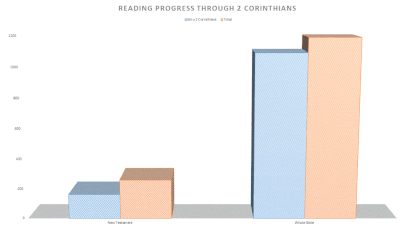Week Forty-Eight Reading Assignment:
2 Corinthians 4 - Philippians 1
"When you find that the Word of God renews you, and begins to be more precious to you than formerly when you heard the doctrines of men, then you may be sure that this is the work of God within you. When you find that it gives you assurance of the grace of God and eternal salvation, it is of God. When you find that it crushes and destroys you, but magnifies God Himself within you, it is a work of God. When you find that the fear of God begins to give you joy rather than sorrow, it is a sure working of the Word and Spirit of God."
(Ulrich Zwingli)
(Ulrich Zwingli)
This Week's Teaching Video: Misdirection
charting our progress
Good Book Review: Not Even a Thank YouOne of the conventions of ancient letters — and a characteristic found in almost all of Paul’s epistles — is the so-called “thanksgiving section.” When Paul wrote to the Romans, Philippians, Thessa-lonians, and such, he would follow his initial greeting with a section that began with a statement like “I thank my God every time I think of you.”
When we read Paul’s letter to the Galatians, however, we find no such customary graciousness. Instead, he moves right from greeting to scolding. Right at the moment when we expect to read that Paul is thankful, we read instead that he is “astonished that you are so quickly deserting the one who called you in the grace of Christ and are turning to a different gospel” (1:6 NRSV). Galatians is distinctive among Paul’s epistles because it is not addressed to a city (cf. Rome, Corinth, Colossae) or an individual (cf. Timothy, Titus, Philemon). Rather, Galatia was a region in Asia Minor where Paul had spent consider-able time during his missionary journeys. He was familiar with the people, the places, and the churches. Along the way, however, he learned that the Galatian Christians had been misled. They had bought into an altered gospel — a heresy — and he was angry and disappointed. He wrote to correct them. And like the child whose parent calls him by his full name -- first, middle, and last -- when the Galatians saw no “thanksgiving section,” they knew they were in trouble. |
Good Book Review: The Joyful EpistleStudents of classical music recognize the creative and lovely use of a motif. It is introduced, reinterpreted, shared among different instruments, woven through movements, yet always some-how the same.
The clear and recognizable motif of Paul’s letter to the Philippians is joy. Fourteen times in this brief four-chapter book Paul refers to “joy” or “rejoicing.” He prays with joy (1:4) for those people who are themselves his joy (4:1). He rejoices (1:18) and invites them to rejoice with him (2:18), even in the face of unfavorable circumstances. And he emphatically urges them to rejoice (3:1, 4:4) at all times. The surprising fact about this letter, which is often nicknamed “the joyful epistle," is its source and setting. Imagine that, with your eyes closed, you heard magnificent music being played. The music was so rich and so powerful, you naturally presumed a full orchestra of skilled musicians. When you opened your eyes, however, you’d be surprised to discover that it was a band of third graders playing kazoos. Likewise, we hear the lovely motif of joy throughout this letter, only to open our eyes and discover that Paul was writing from prison: possibly from some ancient version of Death Row. What a strange source for a joyful epistle, we think. Except, of course, that the prison is not Paul’s source of joy. For Paul’s motif was not inspired by his surroundings, but by his Savior. |
Charles Wesley on Paul's ThornCharles Wesley, co-founder of the Methodist movement and one of the most prolific hymn writers in history, wrote the following lyrics in reflecting on Paul's experience of the thorn in his flesh, his seemingly unanswered prayer, and God's sufficient grace (see 2 Corinthians 12:9).
Full oft have I besought Thee, Lord, To take this thorn away, And still against my foe abhor'd In agony I pray; Rebuking the malicious fiend, O Bid his buffets cease, The painful hour of darkness end, And give me back my peace. Again I ask, this torturing ill Command it to depart; I ask in vain: for yet I feel The mischief in my heart. Thou dost not yet the plague remove, But stayst thyself with me, Thy all-sufficient grace to prove In my infirmity. In wisest love Thou dost delay To answer my request, That, while I for deliverance stay, Thy power on me may rest: While kept I every moment find Thy arms my sure defence, And glory in my weakness join'd To thy Omnipotence. from The Unpublished Poetry of Charles Wesley: Hymns and Poems on Holy Scripture Volume II |
